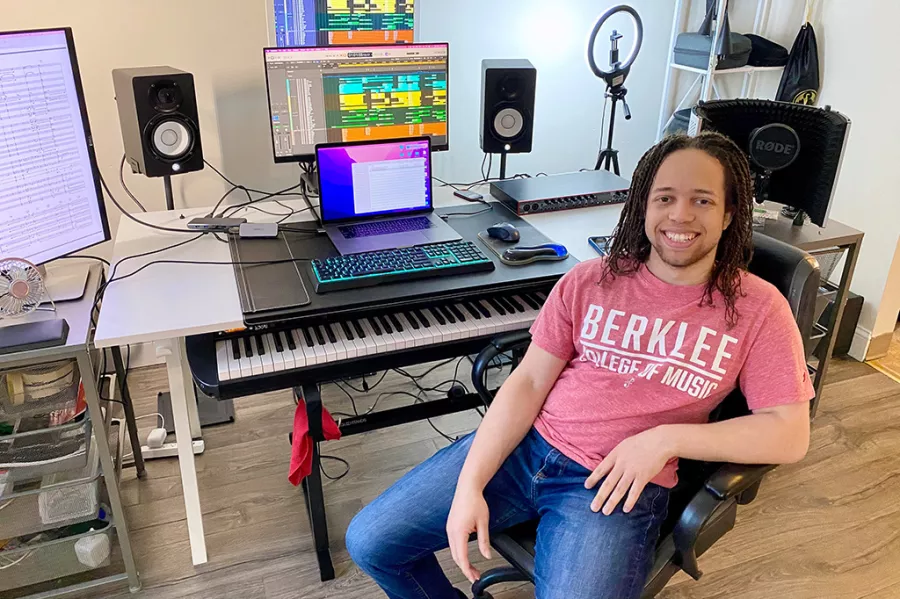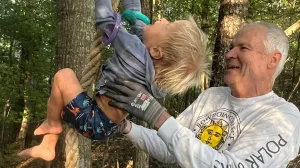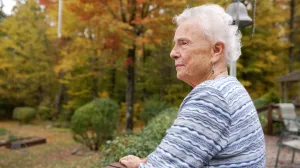
In the words of Frank Sinatra, Anthony (AJ) Johnson had the world on a string. It was 2021, and the Baltimore native was heading to Boston to attend Berklee College of Music in the fall on a scholarship to study musical composition, with the goal of 1 day scoring music for film and television. But that year, AJ started to have dizzy spells and trouble balancing. No one could figure out what was causing the issues.
After starting at Berklee in the fall of 2021, AJ began to experience increased tinnitus (ringing in the ears), hearing loss in his right ear and relentless fatigue. Alarmed, he made an appointment with Kathryn Noonan, MD, a neurotologist in ENT (otolaryngology) at Tufts Medical Center. A hearing test identified a certain pitch that AJ wasn’t able to hear in his right ear. Dr. Noonan sent him for an MRI, which identified the problem — an acoustic neuroma (also called a vestibular schwannoma), a benign tumor growing on the balance (vestibular) nerve and compressing the hearing (cochlear) nerve in his right ear.
Acoustic neuromas are rare. Only about 2,500 are diagnosed in the U.S. every year, the vast majority of which are in adults older than 40. Acoustic neuromas can cause dizziness, ringing in the ears, balance problems and facial numbness and often can lead to permanent hearing loss in the affected ear. The diagnosis would have been upsetting for anyone But for AJ, it was devastating.
“As a composer, the thought of losing my hearing was absolutely terrifying,” he said. “I rely heavily on precise hearing to score and mix my music. To be able to hear from different angles and directions is critically important to me, and really is crucial for me to have a successful career in my field.”
Unsurprisingly, AJ was adamant about doing everything possible to save his hearing. Consultation with Dr. Noonan and Carl Heilman, MD, Neurosurgeon-in-Chief at Tufts Medical Center, the decision was made to wait 6 months with the hope that the tumor would not continue to grow. But grow it did—and rapidly. By spring 2022, AJ was experiencing more significant hearing loss. Steroids helped to restore his hearing, but the benefit was temporary. As the drugs wore off, the hearing loss returned. Surgical intervention would be necessary.
On June 1, 2022, Drs. Heilman and Noonan performed the surgery on AJ’s ear, accessing the tumor from above the front of the ear, in a procedure that usually has the best outcomes for hearing preservation. But during the surgery, the doctors found that the tumor was plastered on the nerve that controlled AJ’s facial muscles. It was clear that attempting to remove the entire tumor from this angle would almost certainly cause permanent damage to AJ’s ability to move his face and smile, and would result in complete hearing loss in that ear. Instead, the doctors removed the bone above the tumor to decompress it and took out as much of the tumor as was safely possible. AJ felt much better at first—it felt like a massive amount of pressure was removed from his head. But over the next 2 years, once again, the tumor regrew and his symptoms–chronic exhaustion and worsening hearing loss—returned. These symptoms affected his schooling particularly in classes requiring recording studio time, where he conducted musicians in live studio sessions. AJ and his doctors knew that if the tumor was not removed soon, his hearing loss would become irreversible.
“There’s a better chance of saving hearing when the hearing is still functional,” said Dr. Heilman. “These type of tumors grow at a rate of 2 millimeters per year, on average. AJ’s was growing faster than that. If we waited much longer to try again to remove the tumor, it would have been too late.”
Drs. Noonan and Heilman knew they needed to act quickly and decisively, but there were few viable options available to them. Scar tissue from the first surgery would likely complicate any future procedure, and decrease the chances of a positive outcome. Dr. Noonan consulted the latest research and literature, and discussed AJ’s case with colleagues across the country. The response was unanimous: AJ would almost certainly go deaf in his right ear. But Drs. Heilman and Noonan were not willing to accept this outcome.
“We never want to give up. We always want to try,” said Dr. Noonan. “We don’t let what we are told is impossible define what is possible.”
With AJ’s blessing, Drs. Noonan and Heilman proposed another operation, but this time using a suboccipital approach, performed from behind the ear instead of in front of the ear. It is typically harder to preserve hearing with this approach, because the balance and hearing structures are in the way, blocking the surgeons’ view. The smallest error—drilling a fraction of a millimeter too deep or severing a tiny blood vessel—would result in immediate and permanent deafness. The location of the tumor (all the way at the end of the ear canal) further complicated the surgery. The doctors knew that the odds were not in their favor.
“Taking into account AJ’s previous surgery, the size and location of the tumor and the difficulty and complexity of the procedure, I’d estimate that we had less than a 5 percent chance of success,” said Dr. Heilman. “But he would have been permanently deaf in his right ear within a year if we didn’t remove the tumor now.”
The surgery took place on May 15, 2024 at Tufts Medical Center. With skill and precision, Drs. Heilman and Noonan were able to access the 16 millimeter tumor and completely remove it, leaving the hearing and facial nerves intact. The painstaking process took 6 hours.
I woke up from the anesthesia and I could hear everything clearly even before opening my eyes. The joy I experienced in that moment far outweighed any pain. I knew there was a high probability that I would lose all auditory function in my right ear after the surgery, and being able to hear when I woke up was overwhelming. My ability to hear is critical to my life. I am beyond thankful.
Anthony Johnson, composer
“AJ really made an emotional impact on all his doctors and members of his care team,” said Dr. Noonan. “He lives for his ears and he needed his hearing to realize his dreams. Knowing this might have made the surgery more stressful for us, but it also made us even more motivated and determined to succeed.”
“He should be permanently cured now,” summed up Dr. Heilman. “It was the perfect outcome.”
Today, AJ is doing remarkably well. With his hearing preserved, his energy and stamina levels are back up, and all anxieties about future tumor growth and hearing loss have subsided. He is off painkillers and is feeling better every day. Now he can turn his attention to other things: his final semester at Berklee, a graduate application to USC’s screen scoring program (widely considered one of the world’s best for composing music to visual media, with direct connections to the film industry), working on upcoming projects with independent filmmakers, awaiting the airing in the coming months of a PBS documentary film for which he scored the music, and ultimately realizing his dream of writing music for stage and screen in Hollywood.
“I am so passionate about music and how it is used to tell a story,” said AJ “It’s a powerful tool that shapes how we interpret the narrative. Even with no dialogue, music can help you understand what’s not explicit. That’s what I do, and it’s amazing to know now that nothing will hold me back!”


